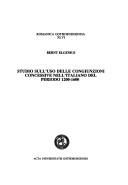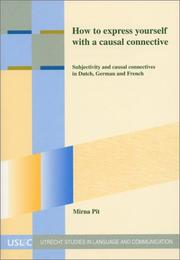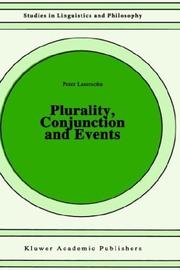| Listing 1 - 5 of 5 |
Sort by
|
Book
ISBN: 9788024619385 8024619385 Year: 2011 Volume: 163 Publisher: Prague : Univ. Charles de Prague, Ed. Karolinum,
Abstract | Keywords | Export | Availability | Bookmark
 Loading...
Loading...Choose an application
- Reference Manager
- EndNote
- RefWorks (Direct export to RefWorks)
Grec (langue) --- Conjonctions (linguistique) --- Greek language --- Conjunctions --- Greek language - Conjunctions
Book
ISBN: 9783110341348 9783110394535 Year: 2015 Publisher: Berlin De Gruyter
Abstract | Keywords | Export | Availability | Bookmark
 Loading...
Loading...Choose an application
- Reference Manager
- EndNote
- RefWorks (Direct export to RefWorks)
An adequate semantic description of German connectors has been lacking to date. This handbook provides a comprehensive description of the meanings of sentence connectors and their systemic linkages. The work is relevant for composing and understanding texts, as well as for a number of subfields in linguistics. Furthermore, it has practical applications in German language instruction, German as a foreign language, and computer linguistics. --
Lexicology. Semantics --- German language --- Conjonctions (linguistique) --- Subordonnants --- Connecteurs (linguistique) --- Adverbs. --- Sentences. --- Allemand (langue) --- Sémantique --- Syntaxe --- Sémantique. --- Subordonnants. --- Syntaxe.

ISBN: 9173463892 9789173463898 Year: 2000 Volume: 46 Publisher: Göteborg : Acta Universitatis Gothoburgensis,
Abstract | Keywords | Export | Availability | Bookmark
 Loading...
Loading...Choose an application
- Reference Manager
- EndNote
- RefWorks (Direct export to RefWorks)
Italian language --- Conjunctions. --- Concessive clauses. --- -Italian language --- -Romance languages --- Concessive clauses --- Conjunctions --- -Concessive clauses --- Romance languages --- Italian language - Conjunctions. --- Italian language - Concessive clauses. --- Italien (langue) --- Conjonctions (linguistique). --- Propositions concessives.

ISBN: 9042008563 9789042008564 9789004458567 9004458565 Year: 2003 Volume: 17 Publisher: Amsterdam Rodopi
Abstract | Keywords | Export | Availability | Bookmark
 Loading...
Loading...Choose an application
- Reference Manager
- EndNote
- RefWorks (Direct export to RefWorks)
The Dutch, German and French languages display a variety of regularly used connectives all of which introduce causes, arguments or reasons, such as Dutch omdat, want and aangezien, German weil, denn and da , and French parce que, car and puisque. Why should languages have different connectives to express the notion of backward causality? The central argument developed in this book is that different connectives express different degrees of subjectivity. In a series of corpus analyses it is shown that the degree of subjectivity of the main participant involved in the causal relation strongly predicts the occurrence of one or another connective. Hence, language users have at their disposal connectives of varying degrees of subjectivity. In an analysis of judiciary sentences, it is revealed that speakers are actually sensitive of this semantic distinction, and sometimes even exploit it for their communicative purposes: in order to conceal their subjective involvement, judges prefer objective over subjective connectives. This volume makes a contribution to the study of language in use, by applying empirical methods to authentic language data. It will be of interest to anyone concerned with discourse coherence, perspective and subjectivity, corpus linguistics and cross-linguistic analyses.
French language --- English language --- Comparative linguistics --- Grammar --- German language --- Causaliteit (Taalwetenschap) --- Causality (Linguistics) --- Causalité (Linguistique) --- Causatiefvormen (Taalwetenschap) --- Causatieve constructies (Taalwetenschap) --- Causatieven (Taalwetenschap) --- Causatif (Linguistique) --- Causative (Linguistics) --- Causative constructions (Linguistics) --- Causatives (Linguistics) --- Oorzakelijkheid (Taalwetenschap) --- Grammar, Comparative and general --- Connectives. --- 801.56 --- Syntaxis. Semantiek --- 801.56 Syntaxis. Semantiek --- Grammar [Comparative and general ] --- Connectives --- Causatif (linguistique) --- Grammaire comparée --- Allemand (langue) --- Français (langue) --- Néerlandais (langue) --- Sémantique --- Syntaxe --- Conjonctions (linguistique) --- Connecteurs --- Connecteurs (linguistique) --- Connecteurs. --- Causitive (Linguistics) --- Connecteurs (Linguistique) --- Connectives (Linguistics) --- Sentence connectors --- Function words --- Syntax --- Linguistics --- Philology --- Grammar, Comparative and general - Connectives.

ISBN: 0792332385 9048144949 9401585814 Year: 1995 Volume: 55 Publisher: Dordrecht Kluwer
Abstract | Keywords | Export | Availability | Bookmark
 Loading...
Loading...Choose an application
- Reference Manager
- EndNote
- RefWorks (Direct export to RefWorks)
Grammar --- Semantics --- Semantiek --- Sémantique --- Sémasiologie --- Grammar, Comparative and general --- Conjonctions (Linguistique) --- Nombre (Linguistique) --- Conjunctions --- Number --- 801.52 --- 801.56 --- -Grammar, Comparative and general --- -Semantics --- Formal semantics --- Semasiology --- Semiology (Semantics) --- Comparative linguistics --- Information theory --- Language and languages --- Lexicology --- Meaning (Psychology) --- Comparative grammar --- Grammar, Philosophical --- Grammar, Universal --- Philosophical grammar --- Linguistics --- Philology --- Comparatieve grammatica. Vergelijkende grammatica --- Syntaxis. Semantiek --- Grammar, Comparative --- 801.56 Syntaxis. Semantiek --- 801.52 Comparatieve grammatica. Vergelijkende grammatica --- Sémantique --- Dual (Grammar) --- Number (Grammar) --- Plural (Grammar) --- Conjunctions (Linguistics) --- Connectives --- Grammar [Comparative and general ] --- Grammar, Comparative and general - Conjunctions.
| Listing 1 - 5 of 5 |
Sort by
|

 Search
Search Feedback
Feedback About UniCat
About UniCat  Help
Help News
News